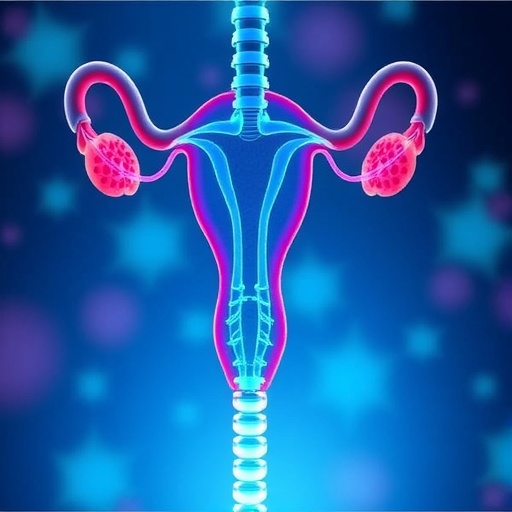In a groundbreaking study led by a team of researchers including Jiang, Zhang, and Meng, the impact of the COVID-19 pandemic on the endocrine and metabolic profiles of women experiencing pathological ovarian aging has been meticulously analyzed. This research emphasizes the intersection of viral illnesses and pre-existing health conditions, particularly how stress and viral infections can exert profound effects on women’s reproductive health. As the global health community grapples with the ramifications of COVID-19, this study brings to light an often-overlooked aspect of the pandemic’s repercussions on hormonal balance and metabolic functions.
Pathological ovarian aging is an important health concern, particularly for women in their reproductive years. Characterized by premature decline in ovarian function, this condition can lead to various health complications, including infertility and increased risk for other health issues. The current research aims to delineate how COVID-19 exacerbates or alters the metabolic processes in women already facing these challenges. By analyzing hormonal levels, metabolic rates, and other biochemical markers, the team presents compelling evidence that the pandemic has multifaceted effects on women’s health.
The profound stress associated with the pandemic cannot be understated. Fear of illness, economic uncertainty, and social isolation have led to significant psychological distress. This stress is particularly concerning for women with pathological ovarian aging, as stress is known to adversely impact reproductive health. Previous studies have highlighted the potential links between stress and hormonal irregularities, thereby creating a basis for further investigation into the pandemic’s unique stressors and their long-term implications on hormone levels.
Moreover, the research team meticulously investigated how acute viral infections, like COVID-19, could influence not only the immediate physiological responses but also long-term endocrine changes. The nuanced interaction between viral load, immune response, and hormonal fluctuation presents a new challenge for managing women’s health in a post-pandemic world. The complexities of these interactions necessitate a focused discourse on women’s reproductive health and how it is affected by global health crises.
Jiang and colleagues employed a comprehensive approach that included both qualitative and quantitative analyses. They surveyed women diagnosed with pathological ovarian aging, assessing their metabolic profiles before and after contracting COVID-19. The longitudinal aspect of this research is crucial, as it highlights trends and patterns in health outcomes over time, giving a clearer picture of the overall impact of the pandemic on this demographic.
A significant finding of the study is the altered metabolic profiles observed in participants following their COVID-19 diagnoses. Hormonal assays indicated fluctuations in estrogen and progesterone levels, which are critical for ovarian function. Furthermore, markers of metabolic stress, such as insulin resistance and inflammatory cytokines, were found to be elevated in women who had contracted the virus. This stark revelation connects the dots between viral infections and disruptions in the endocrine system, suggesting that COVID-19 may have lasting implications for fertility and reproductive health.
Additionally, the research points towards a potential correlation between the severity of COVID-19 infection and the degree of endocrine disruption noted. Women who experienced more severe cases of the virus showed marked changes in their hormonal profiles compared to those with mild or asymptomatic cases. This gradient of impact underscores the necessity for more personalized healthcare approaches following viral infections, particularly for women grappling with pre-existing reproductive health issues.
Furthermore, the findings of this study prompt medical professionals to reassess the management of reproductive health during and after public health crises. The evidence suggests that healthcare providers need to integrate considerations of COVID-19’s impact into their treatment and advisory frameworks for women with pathological ovarian aging. Ongoing monitoring for hormonal imbalances and metabolic disorders may be essential for improving outcomes for this vulnerable population.
As the scientific community continues to analyze the broader effects of COVID-19 on human health, this study sets a precedent for investigating specific populations and their unique health profiles. Insights drawn from the research can be instrumental in forming healthcare policies and practices aimed at addressing the complications that arise from concurrent viral infections coupled with existing health concerns.
Moreover, the study’s implications extend beyond women’s health. It underscores the critical need for a holistic understanding of how infectious diseases can interact with existing health conditions, potentially leading to compounded health crises. Policymakers and public health officials must take heed of such findings to devise more robust health strategies that can handle the intricacies posed by pandemics like COVID-19.
In conclusion, Jiang, Zhang, Meng, and their colleagues provide a vital overview that enhances our understanding of the implications of the COVID-19 pandemic on women with pathological ovarian aging. By shining a light on this intersection of infectious disease and reproductive health, their findings contribute to the broader discourse on women’s health, calling for an urgent reevaluation of healthcare practices in the wake of this global crisis. As we move forward, it is imperative to prioritize research that explores the long-term health outcomes for populations affected by the pandemic, ensuring that we are better equipped to respond to future health emergencies.
Ultimately, this research serves as a clarion call for increased awareness and proactive measures in the realm of reproductive health, emphasizing that global health crises can reverberate far beyond immediate medical implications. The pandemic has reshaped many facets of life, and women’s health must be at the forefront of ongoing discussions about recovery and resilience.
Subject of Research: Influence of COVID-19 on endocrine and metabolic profiles in women with pathological ovarian aging.
Article Title: Influence of COVID-19 on endocrine and metabolic profiles in women with pathological ovarian aging.
Article References:
Jiang, H., Zhang, R., Meng, S. et al. Influence of COVID-19 on endocrine and metabolic profiles in women with pathological ovarian aging. J Ovarian Res 18, 259 (2025). https://doi.org/10.1186/s13048-025-01854-5
Image Credits: AI Generated
DOI: https://doi.org/10.1186/s13048-025-01854-5
Keywords: COVID-19, endocrine health, women, pathological ovarian aging, metabolic profiles, reproductive health, viral infections, hormonal balance, physiological response, health outcomes.




